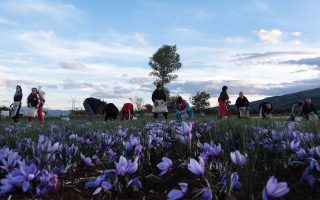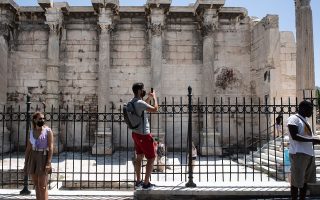Digital nomads with all the bells and whistles
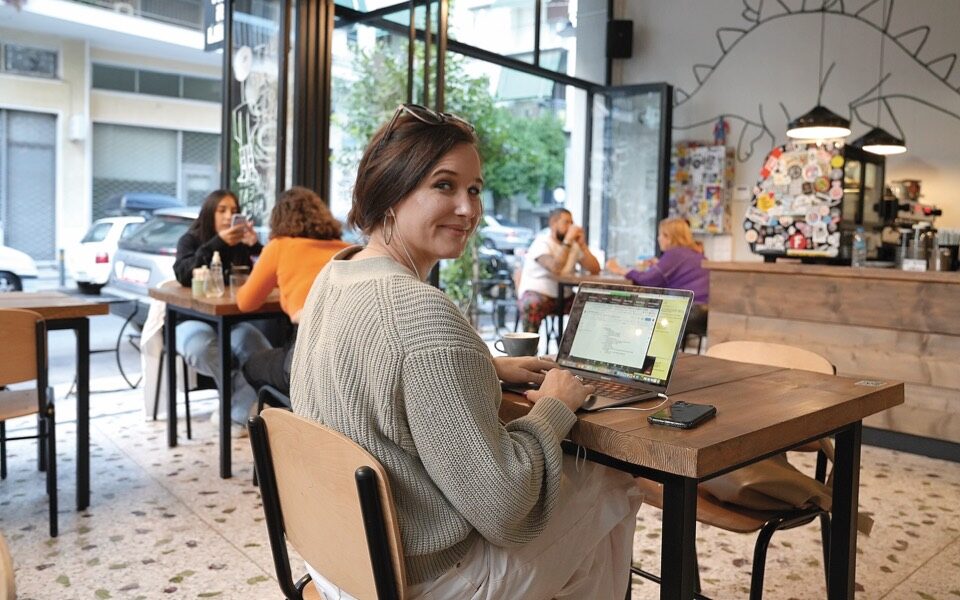
The first companies organizing the stays of people who choose to live in Greece for a few months or years, working remotely, have appeared.
Kathimerini met up with Elizabeth Howell recently as she ordered a cappuccino and prepared for a 6 p.m. business meeting via Zoom with her clients. “Good morning! How are you?” she asked. For the clients in America, it was still morning. “Four years ago, I could never imagine that one day I would be working from a cafe in Koukaki as a communications consultant,” she says.
She was born and raised in a small town in the state of Alabama. After graduating, she worked – on a very tiring schedule – as a lawyer. Her “Greek” story began in Nebraska in November 2018. She was there on a hunting trip with her family, it had snowed, and she had stayed at the hotel. Her 30th birthday was closing in and she wanted to treat herself to an experience she had long been dreaming of, a trip to Greece. That night she booked her tickets and arrived a few months later, in the summer. She was delighted with the country and met Nikos, with whom she kept in touch. She visited Greece again, until at some point she took a the completely unexpected decision to quit her job and move to the country. She took a break to consider her next professional moves, spent time with her boyfriend, and explored the country she had fallen in love with. “What could go wrong?” she told her father, who was concerned about her decision.
She arrived in Greece on February 18, 2020. A week later the first Covid-19 cases made their appearance and before she had time to consider her options, the whole planet went into lockdown. Any plans were canceled, which stressed her out. Like a deus ex machina, a college friend offered her an opportunity to manage the social media of an American company. The pay was minimal, but she enthusiastically got stuck in. Today, four years later, she has an extensive list of clients in Germany, Africa and the United States. And she does all of this from the Athens neighborhood of Koukaki, right next to the Acropolis – or anywhere else she might be. “I work with companies that before Covid did not provide the flexibility for me to work from the other side of the world. It is perhaps the only positive legacy of the pandemic,” she notes.
This is a trend that American Tara Campbell, who is involved in the tourism industry, noticed and led to her setting up Sojrn, a startup that essentially takes care of all the needs of prospective digital nomads. After conducting research, she ended up with nine countries that she could recommend, and Greece was among them. “Primarily because I love your country, and because I had colleagues there that I trust. Additionally, you have good Wi-Fi and many options for accommodation,” she explains.
Ten in Pangrati
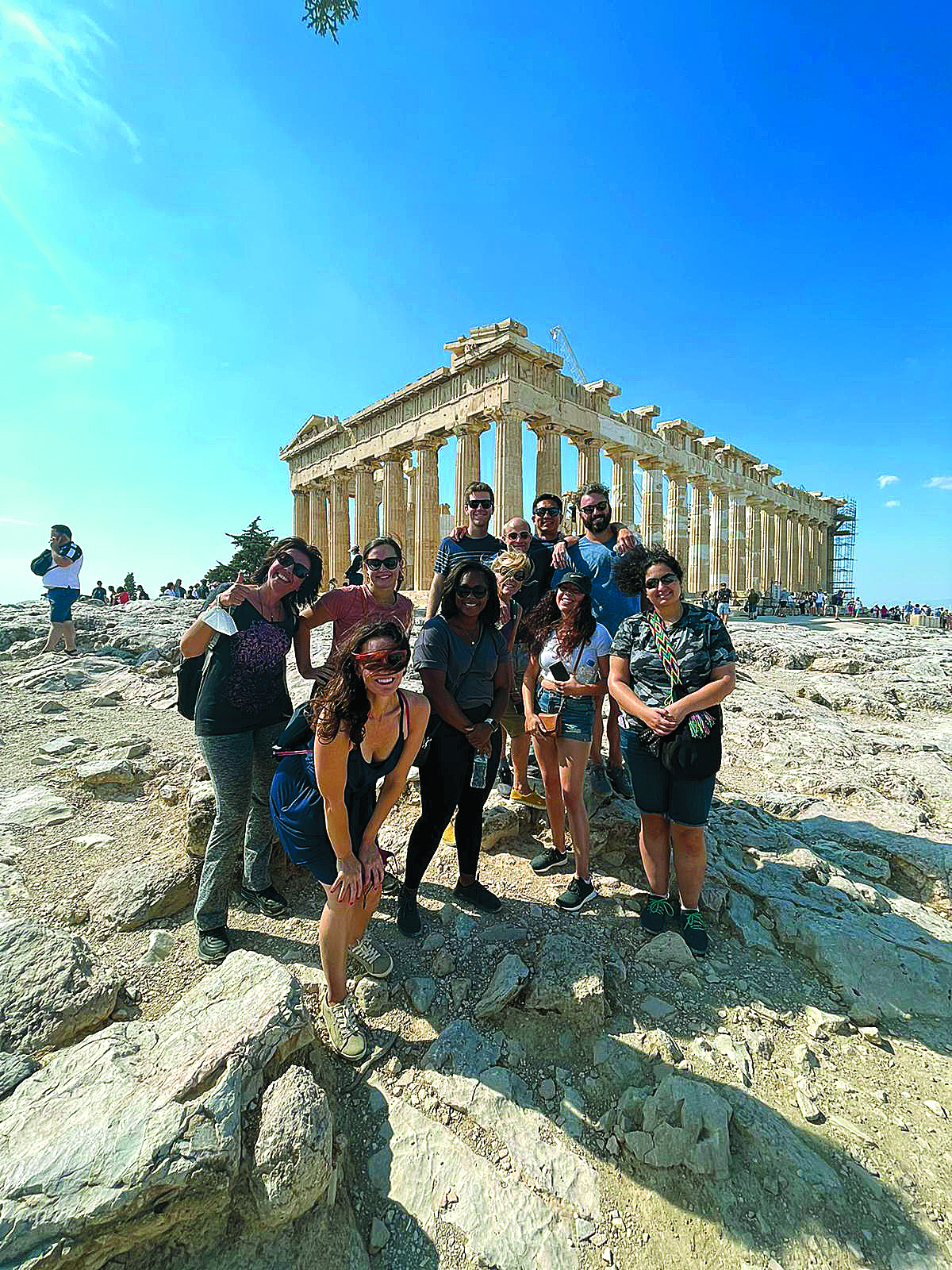 A year ago, 10 digital nomads settled in the Athens district of Pangrati. On their first day, they met with their “host,” Hara Papadoukaki. They walked around the area, were introduced to the local greengrocer, showed the bus stop and given some practical advice – from whether the tap water was fit to drink to what they should do with the toilet paper. They sat down for breakfast and got to know each other – they each said what they do professionally (lawyer, banker, author, lobbyist, high-ranking executives, and business consultants) and their work schedule. The hardest schedule was that of Jack, who worked for Sony Pictures in Los Angeles and had to work until 3 in the morning. They had all installed an application on their phone where they could track the activities of each day before they started work: from Greek traditional dancing lessons, yoga in the National Garden or philosophy seminars. As time went by, the team members started forming their own schedules. Tara often visited the Acropolis to have her morning coffee or they went for a workout at the Kallimarmaro stadium. Late at night, after work, they would go out and schedule excursions every weekend.
A year ago, 10 digital nomads settled in the Athens district of Pangrati. On their first day, they met with their “host,” Hara Papadoukaki. They walked around the area, were introduced to the local greengrocer, showed the bus stop and given some practical advice – from whether the tap water was fit to drink to what they should do with the toilet paper. They sat down for breakfast and got to know each other – they each said what they do professionally (lawyer, banker, author, lobbyist, high-ranking executives, and business consultants) and their work schedule. The hardest schedule was that of Jack, who worked for Sony Pictures in Los Angeles and had to work until 3 in the morning. They had all installed an application on their phone where they could track the activities of each day before they started work: from Greek traditional dancing lessons, yoga in the National Garden or philosophy seminars. As time went by, the team members started forming their own schedules. Tara often visited the Acropolis to have her morning coffee or they went for a workout at the Kallimarmaro stadium. Late at night, after work, they would go out and schedule excursions every weekend.
The participation cost starts at 4,000 dollars a month and includes accommodation, access to a workspace, activities, and support from Hara and the Sojrn team in anything that might pop up. From fixing an internet connection (a common occurrence) to checking the main electric switchboard of the apartment block when the power went out (it turned out it was Daniel’s fault; he works on Wall Street and was using his own modem because he was afraid of losing his connection). Hara had to find a new mattress for a woman, return a faulty pair of shoes, and hold a telephone argument with a taxi driver who wanted to charge 20 euros for a ride from Syntagma Square to Pangrati. During the last team dinner though, all attending were delighted and making plans to return. Four have already done so.
Ioanna Dretta, head of Marketing Greece (the company set up by the Association of Greek Tourism Enterprises and the Hellenic Chamber of Hotels to promote tourism in Greece), remembers that from the very first discussions held with government officials about digital nomads, everyone agreed that it was a particularly interesting audience. Not just because they support the Greek economy, but because they become the best ambassadors for the country. This time last year, Dretta and her team collected funds (from Aegean Airlines, Cosmote and Eurobank) and set up a website, workfromgreece.gr, on which a lot of information is available, from practical knowledge to more adventurous ideas. There are no records of the number of how many have moved to Greece based on the site; however, they monitor its visitors with great interest. The site is mostly visited by Americans, then Russians, and Britons. There was a lot of activity after the summer, but also in the aftermath of significant events – for example, there were more Russian visitors on the site after Russian President Vladimir Putin ordered a partial mobilization.
They receive questions from interested parties daily. On where there are other communities of digital nomads (apart from Athens, there are communities in Hania, Volos and Pilio). They ask for help or specifics. Some consulates are even unaware of the digital nomad visa that the ministries of the Interior and Migration set up in 2021 to facilitate citizens from third countries. Others wonder if their post-tax income must truly exceed 3,500 euros a month to receive the visa (it is a requirement).
Bureaucracy
Anyone who meets the requirements for the visa and wants to stay for more than two years must be granted a residence permit. When Elizabeth from Alabama, who now lives in Koukaki, needed the permit, Nikos took care of the whole process, and she did not face any significant difficulties. The experience of others who spoke to Kathimerini though was very different. Kate, who is from the United Kingdom, began trying to secure her paperwork at the end of 2020. Having tried, in vain, to secure a telephone appointment at the relevant service, she went there in person, but was turned away. In front of the staff, she dialed the service’s number and when she proved that no one picks up the phone, she was allowed to enter. Before they even saw what documents she had brought with her, they gave her a printed paper listing all the requirements. To her surprise, Kate saw it was a guide for retirees (the printer had only printed the first of three pages). Even though it was not clear what documents she needed, she found the requirements on the equivalent site of the British government. She submitted the paperwork, but was then asked for a series of papers that she ended up not needing. During a different attempt at communicating with the authorities, the police officer she spoke with did not speak English and she was later informed that they could not accept that her landlord was not the owner of her residence but was instead subletting the property (she finally asked a friend to declare that she was hosting her). She remembers others like her, usually accompanied by a lawyer, facing tremendous difficulties in their efforts to make Greece their home. “We felt like they were trying to dissuade us,” she recalls. It took more than six months for the permit to be issued, but she was not daunted. She continues to work in Greece, spending her summers on Milos and running a successful London startup from Athens.
Working abroad without migrating
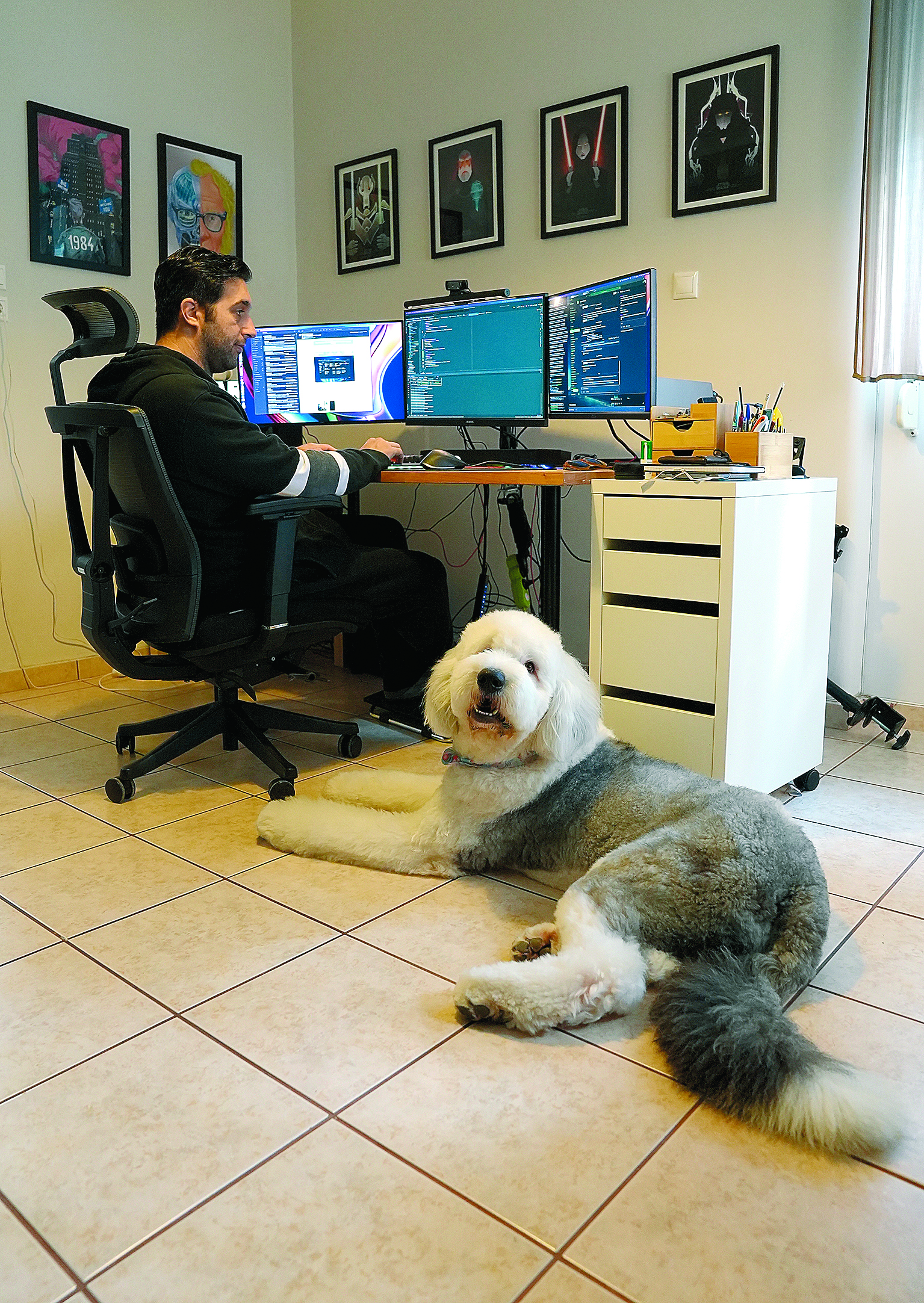 This new trend in working not only affects non-Greeks but also provides the opportunity for Greeks to work for foreign companies at home. One of them is Georgios Rempousis. On several occasions, he had thought that it would be good for his career (as a programmer) to move abroad but found it difficult to do so. However, when his department at a company was shut down, he began looking for jobs in the United States, the United Kingdom, Germany, and Greece. He immediately got a job working for a British company (out of his nine colleagues in his old job, eight of them are working remotely and one moved to the Netherlands).
This new trend in working not only affects non-Greeks but also provides the opportunity for Greeks to work for foreign companies at home. One of them is Georgios Rempousis. On several occasions, he had thought that it would be good for his career (as a programmer) to move abroad but found it difficult to do so. However, when his department at a company was shut down, he began looking for jobs in the United States, the United Kingdom, Germany, and Greece. He immediately got a job working for a British company (out of his nine colleagues in his old job, eight of them are working remotely and one moved to the Netherlands).
Georgios is not considered a digital nomad, but a remote worker. Nothing has changed in his tax status. The British company has signed a contract with a company in Greece that has hired him. He is one of the exceptions though. In the legislative initiative on remote working, the tax and social security framework of remote working has yet to be defined, which is a significant gap in the legislature.
Georgios tells us that his work schedule is flexible “as long as you are diligent.” Despite often missing the bond he developed with his colleagues when working at an office, he sees that new employers are trying to achieve it even in these new circumstances. He will soon travel to the English countryside to get to know his team better. They will plant trees, meditate and talk. But, even during their everyday routine, apart from the online quiz nights or board games or book club, they each receive a “doughnut” every week. A link that they must click on and spend half an hour getting to know a colleague better. Last week, Georgios found himself talking with a Portuguese woman about Andros – his island of origin – the baby he is expecting, and Ozzie, the dog that has become the mascot of his Zoom meetings.
